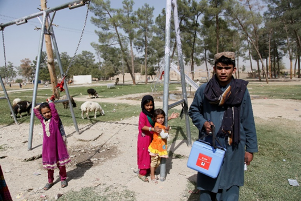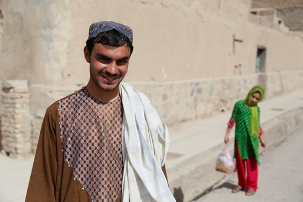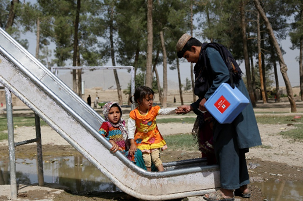 Wajid vaccinates children at a Kandahar park during a Friday “re-visit” campaign day. WHO/J.JalaliKabul 3 July 2017 – Afghanistan is closer than ever to eradicating polio with only four cases reported this year from Kandahar, Helmand and Kunduz provinces. The progress Afghanistan has witnessed in its efforts to wipe out the crippling disease has been to a large extent due to the over 60 000 dedicated polio workers and volunteers who go from house to house during multiple vaccination campaigns every year to ensure all children are vaccinated and protected.
Wajid vaccinates children at a Kandahar park during a Friday “re-visit” campaign day. WHO/J.JalaliKabul 3 July 2017 – Afghanistan is closer than ever to eradicating polio with only four cases reported this year from Kandahar, Helmand and Kunduz provinces. The progress Afghanistan has witnessed in its efforts to wipe out the crippling disease has been to a large extent due to the over 60 000 dedicated polio workers and volunteers who go from house to house during multiple vaccination campaigns every year to ensure all children are vaccinated and protected.
Shamshullah, 25, and Wajid, 18, are polio frontline workers in Kandahar province, vaccinating children under the age of 5 against the paralyzing disease in their communities.
“Polio is a deadly virus and not all people even know about it. This is why I wanted to start volunteering with the campaign 8 months ago. I want to see the virus eradicated from Afghanistan,” Shamshullah says.
“All the people in my village and my family and friends are always encouraging me to work harder and be better at my job. They are proud of me.”
The poliovirus is constrained to small geographical areas of Afghanistan and only four cases have been reported this year. In 2016, 13 polio cases were reported, down from 20 in the previous year.
 Shamshullah during a polio campaign in Kandahar. WHO/J.Jalali“I like to be part of the team eradicating poliovirus from our country. I feel that my work benefits the children because vaccines can save them from this terrible disease, and my work also benefits the whole society,” Wajid says.
Shamshullah during a polio campaign in Kandahar. WHO/J.Jalali“I like to be part of the team eradicating poliovirus from our country. I feel that my work benefits the children because vaccines can save them from this terrible disease, and my work also benefits the whole society,” Wajid says.
Kandahar, like many areas of Afghanistan, is a volatile province with active fighting between government forces and anti-government elements in contested areas. Despite the insecurity and conflict, polio vaccinators such as Wajid and Shamshullah are determined to continue their work, going from door to door in their villages to vaccinate all children.
“I am always proud of my job because I am working for the future of Afghanistan. Children are the future of my country,” says Shamshullah.
Finding and vaccinating all children missed for any reason is crucial for eliminating polio in its last strongholds. Due to the intensified efforts of the Ministry of Public Health, WHO and UNICEF, more children are being reached during immunization campaigns. Post-campaign monitoring data shows a reduction in the proportion of missed children in the latest campaigns, particularly in Kandahar, from 12% in February 2016 to less than 7% in February this year.
 Wajid checks a child’s finger for a finger mark to make sure she has been vaccinated. WHO/J.JalaliSuch successful polio vaccination campaigns would not be possible without the hard work of dedicated frontline workers such as Wahid and Shamshullah.
Wajid checks a child’s finger for a finger mark to make sure she has been vaccinated. WHO/J.JalaliSuch successful polio vaccination campaigns would not be possible without the hard work of dedicated frontline workers such as Wahid and Shamshullah.
“I feel very happy about the work I do and my family is proud too,” says Wajid as he vaccinates children playing in a park in Kandahar City during a Friday re-visit day. During re-visits, vaccination teams return to households and visit public places to make sure all children have been vaccinated during the campaign earlier in the week.
The children take turns going down a slide in the playground and show Wajid their pinky fingers marked with indelible ink, indicating they have already been vaccinated. One child is missing the purple finger mark so Wajid takes out the oral polio vaccine from his blue vaccine carrier to vaccinate her.
“I hope that all children get an education and that their parents support them in this. Before, we didn’t have many hospitals and schools and girls couldn’t go to school. There’s still conflict but life is better now. Now we have schools, girls can also get an education and we have better healthcare and vaccines,” Wajid says. “This gives me hope.”


